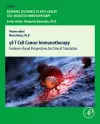
γδ T Cell Cancer Immunotherapy
Marta Barisa - Hardback
£134.00
Dr. Marta Barisa is a Senior Fellow in Experimental Oncology at University College London (UCL). She is based at the Cancer Section of UCL’s Zayed Centre of the Great Ormond Street Institute of Child Health. She completed her undergraduate degree at St. George’s Hospital Medical School in London, UK, followed by training in molecular immunology and cellular immunotherapy at UCL, as well as the Massachusetts Institute of Technology in Boston, USA. Most of her career has focused on immunotherapy drug development for various oncology indications — alone or in combination with additional immunotherapeutic, radio- and chemotherapeutic interventions. For much of her research career she has been based at UCL, which is a world-leading centre for cellular immunotherapy development. It is one of a few institutions dominating global innovation in the space; more than 400 CAR-T patents and 40 patent families have been registered by UCL alone. The Institute of Child Health, where Dr. Barisa is based, is closely associated with Great Ormond Street Hospital for Children. The hospital, with its associated research institute, is Europe’s biggest and highest-ranked centre for paediatric health, excelling particularly with the quality and quantity of its translational research that is coupled to clinical trials. Dr. Barisa’s specialism rests with the design, development and translation of genetically-modified adoptive cellular immunotherapies for solid tumours. In this capacity she is based across two different immunotherapy groups at UCL: (i) the Innate Immune Engineering Lab, which is focused on allogeneic, gene-modified ?d T cell therapeutic development for adolescent and adult solid cancers, including carcinoma and sarcoma, and (ii) the Experimental Paediatric Oncology Lab, where she evaluates a range of autologous as well as allogeneic chimeric antigen receptor (CAR-T) aß and ?d T cell interventions for their ability to target paediatric neuroendocrine tumours. Throughout her career, she has woven together academic and commercial cell therapy development. She has held roles in both private biotech companies and academic institutions - often building novel cell therapy concepts in the academic space, and then funding the late-stage development of these with commercial partners. She serves on scientific advisory boards and holds patents pertaining to novel cellular immunotherapy designs and manufacturing methodologies. She lectures on cell therapy development regularly, and is a co-lead of a postgraduate programme for Cell & Gene Therapy at UCL. Dr. Barisa is regularly invited to speak at and chair discussions at international immunotherapy meetings and publishes in the space frequently. Most importantly in the context of this collection, her research has contributed to a number of world-first clinical trial developments for diverse solid tumour oncology indications. These range from the evaluation of novel checkpoint blocker antibodies as boosters to traditional chemoimmunotherapy, to autologous, drug-switchable aß CAR-T, to allogeneic, armoured, gene-modified ?d T cells. For many of these drug candidates, she has been involved with their journey to a patient from inception: the ideation of a new interventional product, its design, the subsequent product development, the manufacturing process development and ultimately – translation to clinic. The clinical collaborators she and her partners work with are most often closely integrated with the UCL translational research network, but can also be found at other UK locations, as well as various sites in the European Union and the USA. In addition to being coupled with Europe’s busiest paediatric CAR-T trial centre, the Zayed Centre also houses its own cell therapy and lentiviral manufacturing facilities with whom Dr Barisa works closely. It is this broad bench-to-bedside viewpoint and translational perspective that she hopes to bring to the herein enclosed collection of reviews on the current state of ?d T cell immunotherapy.